Related Research Articles
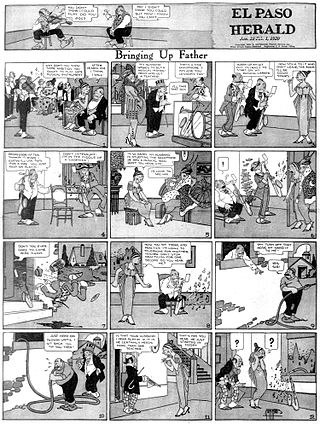
Bringing Up Father is an American comic strip created by cartoonist George McManus. Distributed by King Features Syndicate, it ran for 87 years, from January 2, 1913, to May 28, 2000.
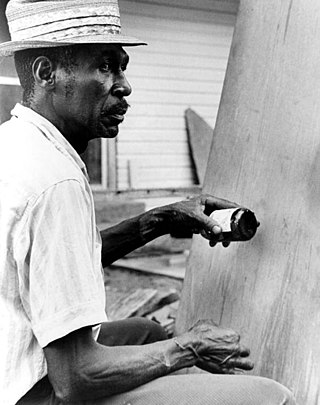
The diddley bow is a single-stringed American instrument which influenced the development of the blues sound. It consists of a single string of baling wire tensioned between two nails on a board over a glass bottle, which is used both as a bridge and as a means to magnify the instrument's sound.
"Corrine, Corrina" is a 12-bar country blues song in the AAB form. "Corrine, Corrina" was first recorded by Bo Carter. However, it was not copyrighted until 1932 by Armenter "Bo Carter" Chatmon and his publishers, Mitchell Parish and J. Mayo Williams. The song is familiar for its opening verse:

"Sweet Home Chicago" is a blues standard first recorded by Robert Johnson in 1936. Although he is often credited as the songwriter, several songs have been identified as precedents. The song has become a popular anthem for the city of Chicago despite ambiguity in Johnson's original lyrics. Numerous artists have interpreted the song in a variety of styles.

Screamin' and Hollerin' the Blues: The Worlds of Charley Patton is a boxed set collecting remastered versions of the recorded works of blues singer Charley Patton, with recordings by many of his associates, supplementary interviews and historical data. The set won three Grammy awards, for Best Historical Album, Best Boxed or Special Limited Edition Package, and Best Album Notes.

"Dust My Broom" is a blues song originally recorded as "I Believe I'll Dust My Broom" by American blues artist Robert Johnson in 1936. It is a solo performance in the Delta blues-style with Johnson's vocal accompanied by his acoustic guitar. As with many of his songs, it is based on earlier blues songs, the earliest of which has been identified as "I Believe I'll Make a Change", recorded by the Sparks brothers as "Pinetop and Lindberg" in 1932. Johnson's guitar work features an early use of a boogie rhythm pattern, which is seen as a major innovation, as well as a repeating triplets figure.
Dirty blues is a form of blues music that deals with socially taboo and obscene subjects, often referring to sexual acts and drug use. Because of the sometimes graphic subject matter, such music was often banned from radio and available only on jukeboxes. The style was most popular in the years before World War II, although it experienced a revival in the early 1950s.
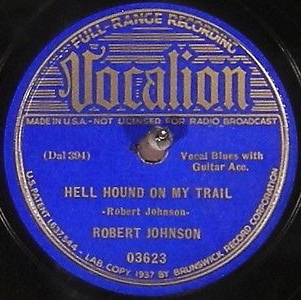
"Hellhound on My Trail" is a blues song recorded by Mississippi Delta bluesman Robert Johnson in 1937. It was inspired by earlier blues songs and blues historian Ted Gioia describes it as one of Johnson's "best known and most admired performances—many would say it is his greatest".
Lil Johnson was an American singer who recorded dirty blues and hokum songs in the 1920s and 1930s.

Eric Gales, also known as Raw Dawg, is an American blues rock guitarist, originally hailed as a child prodigy. As of 2022, Gales has recorded nineteen albums for major record labels and has done session and tribute work. He has also contributed vocals on several records by the Memphis rap groups Prophet Posse and Three 6 Mafia under the name Lil E.
"Tramp" is a soul blues song with funk elements, written by West Coast blues artists Lowell Fulson and Jimmy McCracklin. First recorded by Fulson in 1967, it was his highest-charting single since "Reconsider Baby" in 1954. The song was covered by Otis Redding in a duet with Carla Thomas, and this version reached No. 2 on Billboard R&B chart.
Maggie Jones was an American blues singer and pianist who recorded thirty-eight songs between 1923 and 1926. She was billed, alternately, as "The Texas Moaner" and "The Texas Nightingale". Among her best-remembered songs are "Single Woman's Blues", "Undertaker's Blues", and "Northbound Blues".
Kimberly Michelle Pate is an American singer and television personality. She is best known for appearing as a regular cast member on the VH1 reality television series Love & Hip Hop: Atlanta during its first two seasons, later returning to the show during its fifth season. Michelle subsequently signed with Atlantic Records. Her debut studio album, Rebellious Soul, debuted at number two on the US Billboard 200, and number one on the US Top R&B/Hip-Hop Albums charts. Her second studio album Anybody Wanna Buy a Heart? was released on December 9, 2014. The album debuted at eight six in the US and spawned three singles "Love 'Em All", "Maybe I Should Call" and "Hard to Do". The album sold 87,000 copies in its first week in sales.

"How Do You Know?" is a song recorded by American singer K. Michelle for her second studio album, Anybody Wanna Buy a Heart? (2014). It was released for digital download and streaming on November 17, 2014 by Atlantic Records as the album's first promotional single. "How Do You Know?" lyrics were written by Michelle and Bianca Atterberry and was composed by Timothy Bloom, B.A.M. and Lil' Ronnie. Bloom produced the track, while B.A.M. and Lil' Ronnie served as additional producers. Upon its release of, music critics were positive towards the track, praising Michelle's voice and the lyrics. To promote the single, Michelle performed the song on The Today Show.
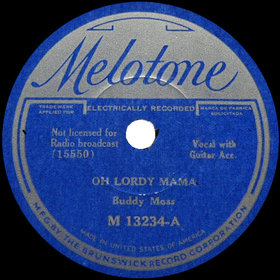
"Hey Lawdy Mama" is a Piedmont blues song recorded by Buddy Moss in 1934. The song became popular among jazz musicians with early recordings by Count Basie and Louis Armstrong. In 1943, a version recorded by Andy Kirk and His Twelve Clouds of Joy, with vocals by June Richmond, was a hit, reaching number four on the Billboard R&B chart.
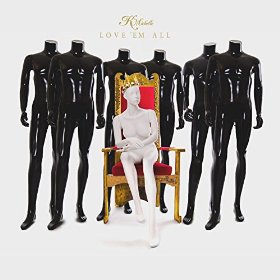
"Love 'Em All" is a song recorded by American singer K. Michelle from the second studio album Anybody Wanna Buy a Heart? (2014). It was released as the lead single from the record on September 16, 2014, through Atlantic. "Love 'Em All" was written by Michelle and Bianca Atterberry and composed by B.A.M., Lil' Ronnie and Shea Taylor. Taylor co-produced the single with Lil' Ronnie and B.A.M. A pop rock and R&B ballad, its lyrics are about sexuality and a woman pursuing multiple relationships. Michelle said that "Love 'Em All" is a response to Chris Brown's 2013 single "Loyal".
"Shave 'Em Dry" is a dirty blues song, first recorded by Ma Rainey in August 1924 in Chicago. It was released on Paramount Records on September 6, 1924. Rainey was accompanied on the recording by two unknown guitarists. The record was advertised in The Chicago Defender on the same date as the record's release.
James "Boodle It" Wiggins was an American blues singer and musician. His best known recordings were "Keep Knockin' An You Can't Get In", a precursor of both "Keep A-Knockin'" and "I Hear You Knocking"; plus his versions of "Corrine, Corrina" and "Shave 'Em Dry", albeit slightly re-titled.
Frank "Springback" James was an American blues and boogie-woogie pianist, singer, and songwriter. He recorded eighteen tracks released by four record labels between 1934 and 1938, as well as possibly providing accompaniment to several other blues musicians. Details of his life are sketchy, and some of his recording activity has been subject to historical guesswork, rather than hard evidence.
Charles Avery was an American blues and boogie-woogie pianist. Although he only recorded one commercially released track in his own name, Avery played piano accompaniment to a number of high-profile blues musicians in the 1920s and 1930s. Details of his life outside the recording studio are limited.
References
- ↑ "GET 'EM FROM THE PEANUT MAN (HOT NUTS)". November 10, 1935. Retrieved November 11, 2022– via Internet Archive.
- ↑ Eugene Chadbourne. "Lil Johnson | Biography & History". AllMusic . Retrieved November 11, 2022.
- ↑ "Decca matrix 90164. Anybody want to buy my cabbage? / Lil Johnson". Adp.library.ucsb.edu. Retrieved November 11, 2022.
- ↑ "Hot Nuts". Fresnostate.edu. Retrieved November 11, 2022.
- ↑ Russell, Tony (1997). The Blues: From Robert Johnson to Robert Cray. Dubai: Carlton Books. pp. 125–126. ISBN 1-85868-255-X.